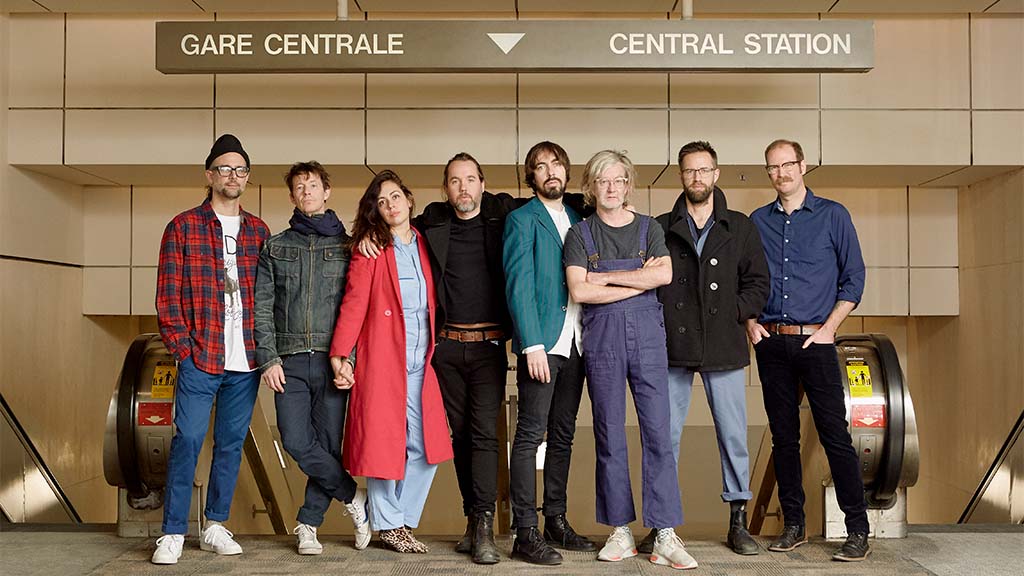
Another Planet Entertainment is committed to producing safe events. Please review our most up-to-date COVID-19 policy requirements for entry on our Health & Safety page.
* Policy is subject to change
This event is all ages.
$39.50 – General Admission Floor
$39.50 – Reserved Seating
*plus applicable service fees
For an additional $60.00, you can opt in to upgrade your experience to include access to the exclusive Telegraph Room before, during and after the show! Please note all Telegraph Room upgrades are subject to availability.
Join us at The Den one hour before doors for food & drinks!
All doors & show times subject to change.
Broken Social Scene
At the dawn of the 21st-century, just as the internet began infecting every aspect of our daily lives, Toronto musicians Kevin Drew and Brendan Canning began building a social network of their own. Like other such networks you’re familiar with, it quickly expanded to include friends, and friends of friends. It became a place where they could live out their best lives or fret about the fragile state of the world. And yes, occasionally, it became a forum for arguments and oversharing. But this social network didn’t require you to stay glued to your smartphone to take part in it. Quite the opposite: Since debuting in 2001, Broken Social Scene have personified the unyielding, incomparable power of IRL human connection.
It’s hard to know what to make of an ongoing experiment like Broken Social Scene. Is it a band? Not quite. Bands tend to have defined memberships and aesthetics and goals; Broken Social Scene have never been bothered with such limitations. Is it a cult? Nah—some of them have the beards, but they could never agree on the right robes. Is it a collective? Certainly, it can seem that way when you see some 15 people crowding the stage, but BSS aren’t so much a united front as a perpetually mutating aggregate of competing creative energies.
Once a two-person basement recording project, Broken Social Scene came to life onstage as a shadowy improvisational entity with a revolving-door roster, each concert a wholly unique experience dependent on the room, the weather, what they ate for dinner that night, and who was dropping in to play. Where the band’s 2001 debut album, Feel Good Lost, presented BSS as an anonymous ambient project that reflected its humble, homespun origins, their electrifying live performances from that era rallied an extended family of performers with roots in post-rock (Justin Peroff, Do Make Say Think’s Charles Spearin), Latin jazz (Andrew Whiteman), art-folk (Feist), synth-pop (Amy Millan and Evan Cranley, also of Stars), dance-punk (Metric’s Emily Haines and Jimmy Shaw), and country rock (Jason Collett).
But by pursuing improvisational freedom over commercial considerations, Broken Social Scene set a new gold standard for indie rock in the 21st century with 2002’s You Forgot It In People, an album that pushed the genre far beyond its noisy ’90s slacker roots toward a more sonically expansive, emotionally expressive vision. And with follow-up releases like the blissfully chaotic Broken Social Scene (2005), the rapturous Forgiveness Rock Record (2010), and the intricate, insidiously melodic Hug of Thunder (2017), Broken Social Scene have amassed a thrillingly amorphous, unpredictable body of work.
Throughout their two-decade run, Broken Social Scene have achieved all the markers of modern indie success—rave reviews from Pitchfork, invites to play Coachella and Lollapalooza, multiple Juno Awards and Letterman appearances, and name-drops in Lorde songs. And their victories have ultimately been Toronto’s, through the establishment of a record label (Arts & Crafts) and music festival (Field Trip) that became rallying points for the local scene and nurtured the next generation of indie upstarts. But arguably Broken Social Scene’s greatest accomplishment is their mere existence, as a conglomerate that continues to defy all logistical convention and musical expectations. They’re living proof that underdogs are most effective when travelling in a pack, that mass audiences can be led into uncharted waters through collective enthusiasm, and that the better world we all dream of begins with community.
In both sound and personnel, Broken Social Scene has changed a lot since their 2001 inception. But one thing has remained constant—at the end of every show, Kevin Drew bids the crowd adieu by telling everyone to “enjoy your lives.” More than just a simple farewell, those words are a call to action—to put down your goddamn phone, get outside, and be part of a social scene of your own.
Jasmyn
When we look at the patterns of our lives, what do we see? A repeating line, or rows of shapes? Do they change color? Size? Form? And does the pattern change entirely as we enter a new phase? These are the questions Jasmyn asks on her debut solo album In The Wild, where the art of reshaping, shifting and grounding is encouraged with an open hearted vigor. By diving far into ourselves and ruminating on the reflection we see in the mirror, we can unearth a new kind of clarity, where the balance we’ve been searching for slowly begins to reveal itself.
As the front person of Weaves, Jasmyn has been a touring musician for the better part of a decade. Over their career, the band received two Polaris Music Prize shortlists, two JUNO nominations for Alternative Album of the Year, and two SOCAN Songwriting Prize nominations. The four-piece also played across the globe, including Glastonbury festival, and received critical acclaim from the likes of Pitchfork, NPR, The Guardian and Elton John’s Rocket Hour.
When she left the band in 2020, it was a chance to slow down her pace of life and craft a space that was truly her own, away from the bustle of constant touring and the noise of the city. Packing up her life in Toronto, Jasmyn moved to Hamilton, where the serene sounds of Lake Ontario and delicate, deliberate way of life inspired her to take a breath and immerse herself in the outdoors. By taking the time to feel her feet in the grass, the surroundings sparked a sense of freedom, and saw Jasmyn build a portal for new energies and new possibilities.
That transition is introduced with the bright, percussive opener “Green Nature,” as Jasmyn declares “Start a new chapter in your life // Like it’s the only right way.” Huge, echoing drums and jumping harpsichord ripple alongside Jasmyn’s assertive, all encompassing vocal. It’s a grand opening, a curtain pulled back, and an exhale among the chaos of change. “It’s the beginning of a new version of myself,” she explains. “As soon as I was able to make a shift, I started noticing new things coming into my life and a sense of freedom.” She leans further into the cyclical nature of our different selves on the kaleidoscopic “Edge of Time,” where pulsating electronic rhythms guide a musing on regret and endurance. “I feel like we all live in this good/bad scenario of the decisions we’ve made and how those decisions have affected people,” she says. “How can you continue in your life while living with the shifts that have happened?”
The erratically-charged “Cruel Moon” acts as an invitation through a new door, where the luminous, repeating speckles of a disco ball pour over the joy found in simply moving, and releasing yourself from self-constraint. It’s the feeling of closing your eyes and letting the nature of the melody guide you, unafraid of what others might think or say. “I can be something else. I can move into something new,” she says. “It’s about letting go. Just live your life, you know? You never know how long you’re here.”
This interrogation of the self blossoms on the album’s guitar-led title track, as Jasmyn honors the loners of the world. As someone who has often felt isolated at certain points in her life, “In the Wild” asks what happens when two outsiders come together. “I wanted to express a feeling of connection to those people who maybe feel like they’re an outsider, or don’t fit into the mold of what this world is.” Through patchwork piano keys and haunting, ethereal backing vocals, Jasmyn asks: “What do you do when you feel disconnected from the people you’re supposed to be closest to?” It’s a physical unblocking of herself and her soul, and offers a guiding hand for anyone unsure of their next steps.
To piece together this new phase, Jasmyn worked with Grammy award-winning producer John Congleton at his studio in Los Angeles. For Jasmyn, it was important that the sonic universe of the album reflected the ebbs and flows of a transitional chapter, where she could be free to create whatever felt right in that moment. While there’s a continual middle ground that threads itself throughout the album, In The Wild makes room for the quieter, introspective moments, as well as the booming, blossoming catharsis. “I wanted to create songs that would help people feel a type of confidence in themselves,” she says.
It’s on closer “Purple Reflections” that Jasmyn leaves us with this sense of confidence. During the writing process, she became interested in chakras, and especially how the purple chakra represents the crown and connects us to a higher consciousness. Through gliding synths, Jasmyn laments “staring into your eyes feeling like magic”; but this isn’t a song for someone else, this is a love song to the mirror, and it’s through this kind of manifestation that we can reach our truest selves. In The Wild is a call to care, and a call for patience, joy and trusting your instincts. Here, Jasmyn has constructed a raft for those of us feeling unmoored from ourselves.
